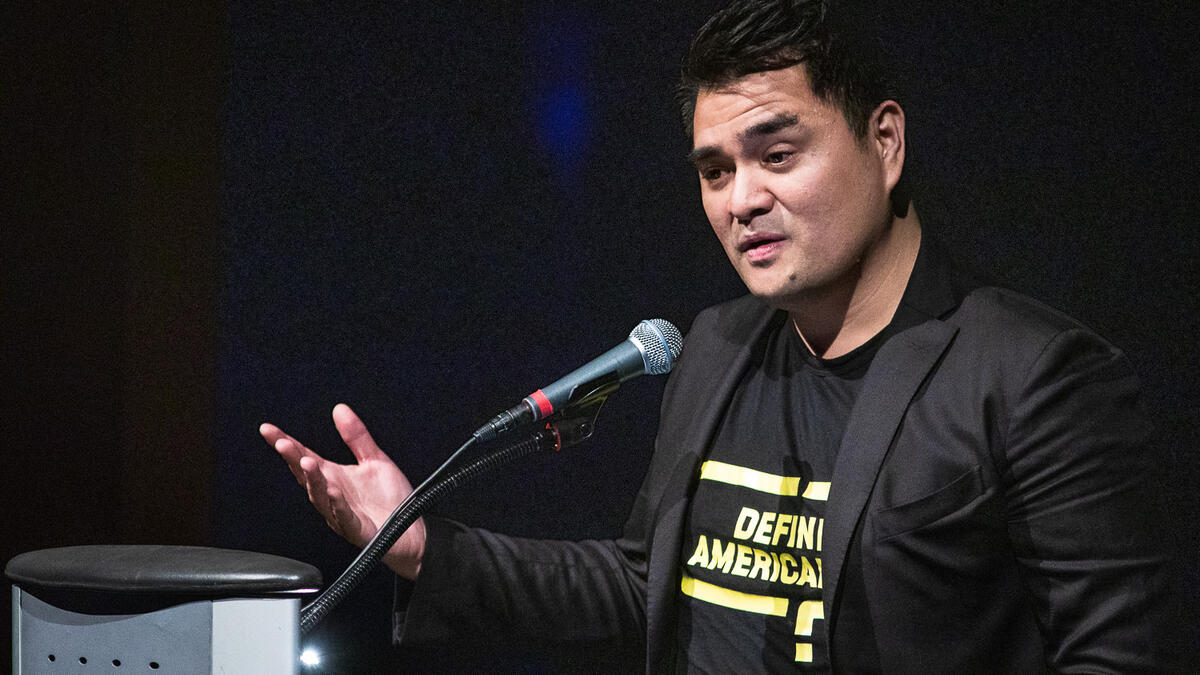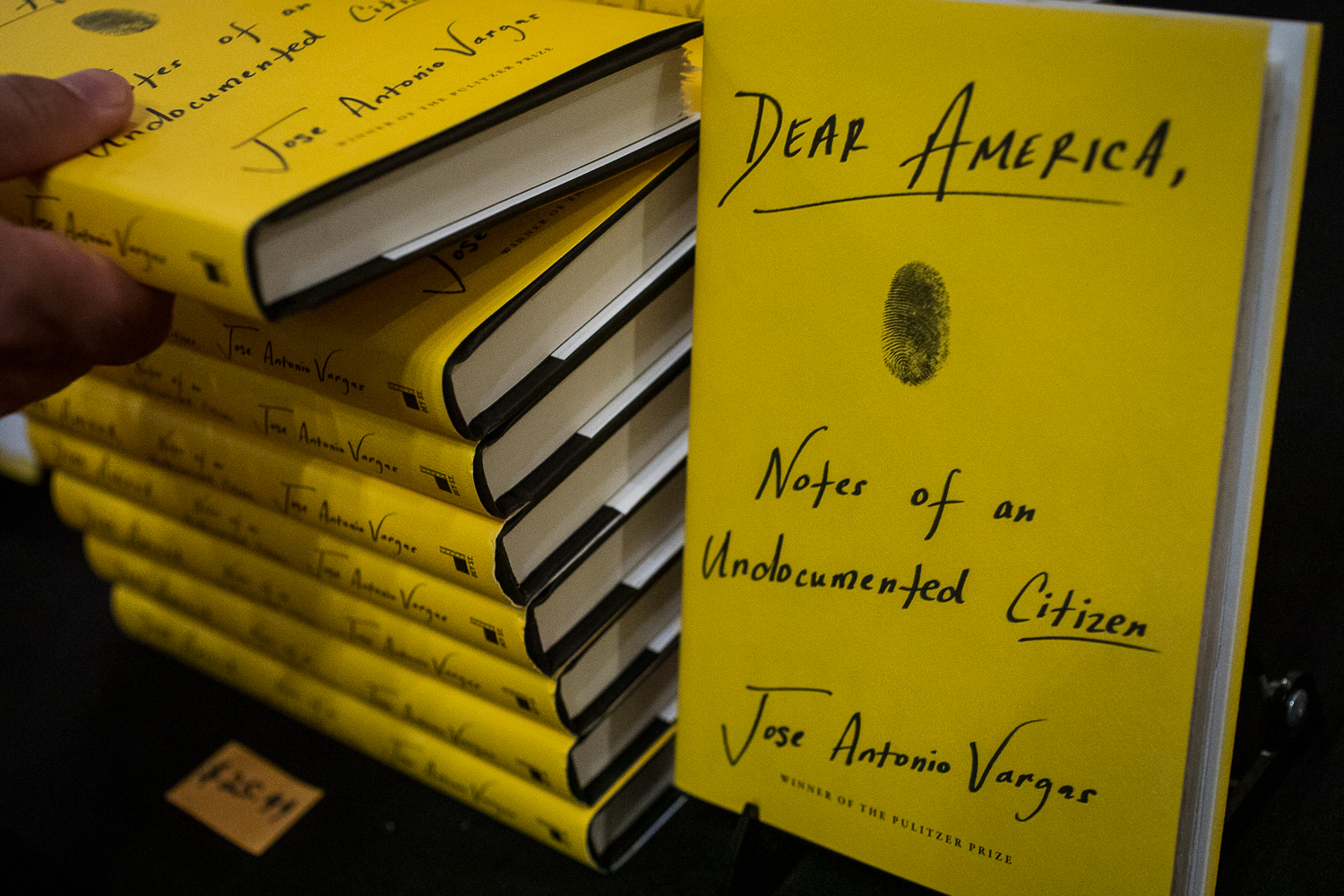Living as an undocumented immigrant in America exacts a painful price personally and for the country, according to Jose Antonio Vargas, a journalist and filmmaker.
Vargas, who was born in the Philippines and came to California as a 12-year-old, described the toll at a lecture on Thursday night titled “Define American: My Life as an Undocumented Immigrant.” He is the 2019 Flinn Foundation Centennial Lecturer in Barrett, The Honors College at Arizona State University. He spent the day Thursday with Barrett students and gave his talk that night at the Tempe Center for the Arts.
Vargas discovered that he wasn’t here legally when he went to get a driver’s license at age 16 and the clerk in the motor vehicle office realized that his green card was fake. Vargas, who lived with his grandparents, confronted his grandfather, who told him: “You’re not supposed to be here.”
“The plan was that I would work at the flea market as a janitor and marry a woman who was a U.S. citizen and become American,” he said.
“I told my grandfather, ‘I can’t do that. I’m gay.’
“I told him that one lie was enough.”
His book, “Dear America: Notes of an Undocumented Citizen,” published last year, is based on his most painful experiences.
“I came up with 23 and they’re about lying, passing or hiding,” he said.
He described lying about not wanting to travel to Mexico for a good friend’s wedding when actually he couldn’t risk being detained while returning to the United States.
“So you lie and you try to pass,” he said, describing how he tried to get rid of his Filipino accent by studying Bill Moyers and Tupac Shakur.
“From the age of 16 to 30, I was hiding in plain sight.”
Vargas said he called Immigration and Customs Enforcement himself.
“I said, ‘Hi, I haven’t heard from you. Are you going to deport me?’ And they said, ‘We don’t comment on individual cases.’ It’s not that I’m hiding from my government. I think they’re hiding from me.”
He said the biggest loss was his relationship with his mother, who’s been waiting 15 years to immigrate to the United States.
“We lost a lot. Not that I don’t thank my mother for making that sacrifice, but I wonder if that sacrifice was worth it. I think I would have preferred my mom.”
Vargas described how he “came out,” in 2011, by writing a column in the New York Times revealing his immigration status, against the advice of all of his immigration lawyers. Beforehand, he prepared himself for every possibility, such as being detained or deported. Because employers are not allowed to hire undocumented immigrants, he quit his job at the Huffington Post. He paid off his credit card bills.
But the result has been unexpected.
“You can’t hire me, but I can hire you,” he said. “So undocumented immigrants can start businesses and hire people.” He started a nonprofit called Define American and a production company.
“So this whole situation forced me to be something I never thought I’d be and that’s an entrepreneur.”
Jose Antonio Vargas' new book, "Dear America: Notes of an Undocumented Citizen," is on sale following his "Define American: My Life as an Undocumented Immigrant" keynote at the 2019 Flinn Foundation Centennial Lecture. Photo by Charlie Leight/ASU Now
After writing the book, Vargas traveled the country and said that the most common question he’s been asked is, “Why not just make yourself legal?”
“Because I’m a masochist and this is so much more fun,” he joked. He lamented that even many journalists don’t realize that there is no process for undocumented immigrants to “become legal.”
“They ask me why I’m mooching off society. I wrote a book and I’ve paid so much in taxes I should be a Republican.”
He said that people who are working in America without legal documentation paid $23.6 billion in taxes in 2015.
Vargas said that he’s heard many politicians proclaim that immigrants should only be allowed to stay if they earn it.
He then asked the audience to raise their hands if they’re American citizens.
“What have you done to earn it?”
Top photo: Jose Antonio Vargas delivers his "Define American: My Life as an Undocumented Immigrant" keynote at the 2019 Flinn Foundation Centennial Lecture, hosted by Barrett, The Honors College, in the Tempe Center for the Arts on Sept. 19. Vargas is a Pulitzer Prize-winning journalist, an Emmy-nominated filmmaker and a vocal advocate for the human rights of immigrants. Photo by Charlie Leight/ASU Now
More Law, journalism and politics

Native Vote works to ensure the right to vote for Arizona's Native Americans
The Navajo Nation is in a remote area of northeastern Arizona, far away from the hustle of urban life. The 27,400-acre reservation is home to the Canyon de Chelly National Monument and…

New report documents Latinos’ critical roles in AI
According to a new report that traces the important role Latinos are playing in the growth of artificial intelligence technology across the country, Latinos are early adopters of AI.The 2024 Latino…

ASU's Carnegie-Knight News21 project examines the state of American democracy
In the latest project of Carnegie-Knight News21, a national reporting initiative and fellowship headquartered at Arizona State University’s Walter Cronkite School of Journalism and Mass Communication…

